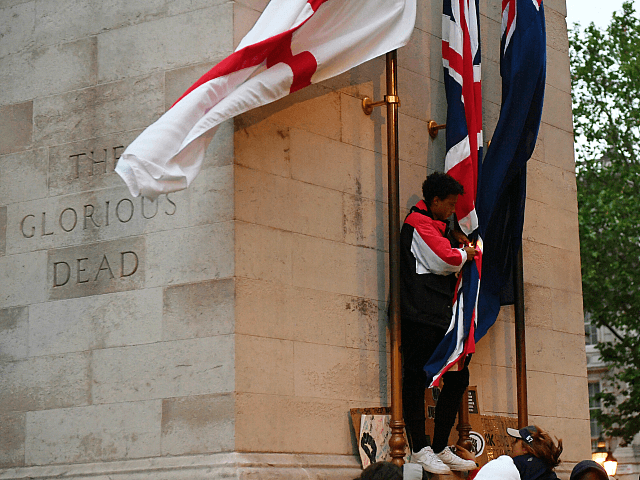Nigel Farage and Douglas Murray have criticised the notionally ‘conservative’ government for failing to defend monuments that were vandalised by Marxist Black Lives Matter activists.
“When the Churchill statue and Cenotaph were defaced, this government didn’t say a word. We expect better than that from our leaders,” Mr Farage said on Tuesday.
The Brexit Party leader made the remarks while sharing a clip from his interview with writer Douglas Murray, where the two discussed the failure of the Conservative government to live up to its name and conserve society by defending monuments from attack by Antifa and BLM.
In June, including on the anniversary of D-Day, far-leftists graffitied the statue of Winston Churchill and defaced the Cenotaph, with one activist trying to set the war memorial’s union flag on fire.
Boris Johnson’s response to the vandalism of Churchill’s statue was weak, with the prime minister saying that while he disagreed with tearing down statues, his professed hero had “sometimes expressed opinions that were and are unacceptable to us today”. A number of protests took place before police were finally posted at the Parliament Square monument.
Speaking to Farage on Sunday, Mr Murray remarked: “We have a Conservative government with an 80-seat majority, and yet every day there is an example of something which no conservative could possibly agree to.”
Murray went on to describe a government “Missing In Action” while “our Holy Places of a Nation” such as the Cenotaph were being daily defaced, leaving, instead, the volunteers from the Household Cavalry to clean the monument and be verbally abused by Black Lives Matter protesters who criticised the young patriots, saying to them: “‘You care about your precious monuments.'”
“That was when we should say, ‘Yes. Yes, we care about our precious monuments. They’re not precious little monuments. These are our holiest places, and we make no apology for it,'” Mr Murray said.
“Nobody from government said that. Nobody,” he observed.
“Yet, Middle England is saying it. I sense it, I feel it,” Mr Farage responded, with a poll from July backing up the Brexiteer’s claims.
Britain’s establishment cowed in many respects to the aggressive BLM, with Mayor of London Sadiq Khan and the City of London Corporation vowing to launch investigations into “problematic” monuments which may have links to slavery. The Church of England also, for the second time, apologised for slavery. The bust of a founder of the British Museum was removed to a case after pressure from BLM.
The BBC was the most eager to appease the Marxist group, vowing in June to plough £100 million into “diverse and inclusive content” before announcing it was letting go of hundreds of staff in regional offices to cut costs.
Members of the public joined the #DefundTheBBC campaign to criticise the broadcaster for its biased coverage of the BLM protests, which at one point describing a riot where 14 police officers were injured as “largely peaceful”. At the time, Mr Farage slammed the broadcaster — and the liberal-metropolitan Sky News — for portraying Britain as a “seething cesspit of racists and bigots”.
In recent weeks, the BBC announced that it would be performing patriotic favourites “Rule, Britannia!” and “Land of Hope and Glory” without lyrics at the Proms, reportedly after pressure from BLM activists who considered the sentiments expressed offensive.
Mr Murray told Farage in his recent interview that he “cannot understand what the BBC is thinking on this. They give the impression of a guiltiness that makes me very suspicious.
“What had the BBC to do with the killing of George Floyd? Why do they present it as if they were in some way, complicit?… What are you hiding? What’s the problem with you people? Why do you think because of a Minnesotan policeman’s actions, we’re not allowed to sing ‘Rule, Britannia’?
“Do you think we can’t cope with a few verses of song? Do you think we’re going to invade France if we sing ‘Rule, Britannia’? Do you think we’re going to start lynching people if we sing ‘Land of Hope and Glory’?”
“I think this is very revealing. These people do not trust themselves, so they don’t trust us. But we do trust ourselves. We know that the British people are a decent people and that we can cope with songs,” he added.
Timed with the arrival of the BBC’s new director-general Tim Davie — who told staff they have to represent all of the UK, not just liberal London — BBC Proms u-turned and announced on Wednesday that the lyrics would be sung at the Last Night of the Proms on September 12th.
Mr Farage responded to the news, saying: “This just shows the power of public pressure and how hopelessly out of touch the BBC are with their own license fee payers.”
